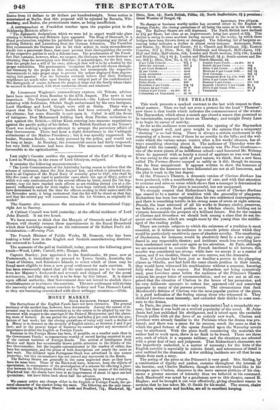THE THEATRES.
This week presents a marked contrast to the last with respect to thea- trical matters. Then we had not even a pretext for the head " Theatres"; now there is that bustle which indicates the commencement of the winter. The Haymarket, which about a month ago closed a season that promised to be interminable, reopened its doors on Thursday; and tonight Drury Lane is to begin its career of activity. As far as the audience were concerned, the opening of the Haymarket, Theatre argued well, and gave weight to the opinion that a temporary " shutting " is no bad thing. There is always a certain excitement in the reopening of a house, even if there be no novelty in the bills; and the wel- come which the various actors receive after a few weeks' absence, has al- ways something cheering about it. The audience of Thursday were de- lighted with the comedy, though that comedy was The Poor Gentleman— one of the worst pieces of an indifferent school—and honoured Mr. Webster when he appeared with as hearty a round of applause as was ever heard. It was owing to the same spirit of good nature, we think, that a new farce called The Fortune.Hunter escaped so safely as it did; though its success was far from unequivocal. It appears written to show the humours of Margate; but the humours as here delineated are not at all humorous, and the plot is weak to the last degree.
At the Princess's Theatre, a dramatic version of Clarissa Harlowe has been produced, with a considerable degree of care, and with that attention to costume and muse en scene which shows that a manager is determined to make a sensation. The piece is successful, but not unopposed.
We strongly suspect that Richardson's long novel of Clarissa Harlowe has ceased to be a matter of tradition with the generality of playgoers. Richardson has been less reprinted than his two celebrated contemporaries, and there is something terrific in his strong doses of seven or eight octavos. Pamela, the least esteemed of all his works in literary circles, preserves, we believe, a certain fixed position as a kitchen classic, holding out to virtuous housemaids the prospect of a brilliant future. But for the readers of Clarissa and Grandison we should look among a class that do not fre- quent our theatres, which are sought more by the young than the middle- aged of the reading public. There are certain subjects to which the existence of a tradition is most essential, as it induces an audience to concede points about which they would be particularly sensitive in eases of absolute novelty. The smothering of Desdemona, for instance, would be absolutely fatal to a new play pro- duced in any respectable theatre; and incidents much less revolting have been condemned over and over again as too atrocious. At Paris, although we are accustomed to consider the French hardened to all horrors, this murder was considered too strong; while here we accept it as a matter of course, and if we shudder, blame our own nerves, not the dramatist.
Now, if Lovelace had been just as familiar a person to the playgoing classes as Othello, and had held the same classic position in their minds, they would have witnessed his machinations without a murmur, knowing fully what they had to expect. But Richardson not being extensively read, poor Lovelace came before the audience of the Princess's Theatre- without his proper letter of recommendation; and we are not at all sur- prised that the situation of Clarissa in the house of her persecutor, and his very deliberate attempts to seduce her, appeared odd and somewhat improper to many of the persons present. The circumstance that Jack Alacdonald's defence of Clarissa was the most popular portion of the piece, is a good -indication of the feeling among those who witnessed it. They disliked Levelace most intensely, and extended their dislike in some mea- sure to the drama. In Paris, the piece (for ours is only a translation) had a remarkable suc- cess; but then it IVES built on a revived popularity of the novel. M. Jules Janin had just published his abridgment, and it seized upon the excitable French public with all the force of an entirely new work. Clarissa and Lovelace were already familiar to the Parisians when the drama was pro- duced; and there was a cause for its success, much the same as that to which the good fortune of the operas founded upon the Waverley novels may be attributed. With the piece itself, considering the materials the author had to work upon, there is no fault to be found. There are three acts, each of which is a separate tableau; and the situations are selected with a great deal of tact and judgment. That Richardson's characters are but imperfectly embodied, is a matter of necessity; for the forte of the English novelist is especially in minute detail, and minuteness of detail is ever unfitted for the dramatist. A few striking incidents are all that he can obtain from such a story.
The acting of the piece at the Princess's is very good. Mrs. Stirling, by a combination of dignity and pathos, sustains throughout the interest of the heroine; and Charles Mathews, though too obviously fiend-like in his attempts upon Clarissa, discovers in the more earnest portions of his cha- racter a greater amount of intensity than we believed at his command. Jack Macdonald was acted by a gentleman new to this theatre, named H. Hughes; and he brought it out very effectively, giving abundant reason to surmise that he has taken Mr. a Smith for his modal. The scenes, chairs and tables, waistcoats and buckles, ere all in excellent keeping.


























 Previous page
Previous page